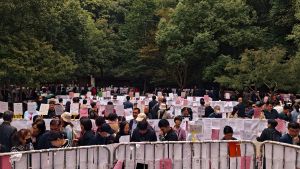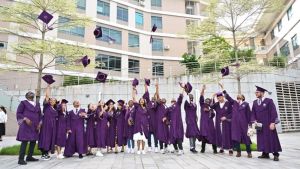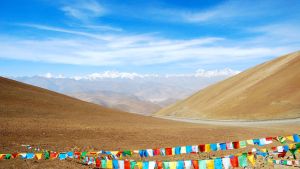
Fear in the Classroom
How Hong Kong’s National Security Law Suppresses Academic and Intellectual Freedom
On 30 June 2020, the Hong Kong Government announced that the Hong Kong National Security Law (NSL) would come into effect before the public had even laid eyes on its content. Since the law is broad and, some argue, purposely vague, it grants the Hong Kong and Chinese governments extrajudicial authority to criminalise dissenting voices under the guise of national security and anti-subversion (Wei 2020). Since then, the Hong Kong Police have used the law to deter street protests and criminalise activists, claiming that popular protest slogans such as ‘Liberate Hong Kong’ and ‘Disband the Police’ have violated the NSL because they are seditious (Amnesty International 2020; Wong 2020a). In conjunction with the suppression of protests and freedom of speech, the NSL has had a chilling effect in education. As the government crackdown on protests and dissent intensifies, teachers have borne the brunt of Beijing’s and Hong Kong Chief Executive Carrie Lam’s ire. Just a few days after the implementation of the law, pro-establishment lawmakers began calling for the installation of video cameras in classrooms to monitor teachers’ speech (RTHK 2020a).
At the same time, the threat the NSL poses to education and intellectual freedom extends beyond Hong Kong. The law has been used to target activists abroad, including a US citizen, Samuel Chu, who has been lobbying American lawmakers as the founder and director of the Hong Kong Democracy Council (Yang 2020). During the pandemic, classes in Hong Kong and many other countries have moved online. The use of videoconferencing platforms and recordings intensifies the threat of surveillance and criminalisation transnationally for both teachers and students, which in turn encourages self-censorship. The co-occurrence of the NSL and online teaching during the pandemic prompts educators to drastically reexamine and adapt their pedagogical practices to protect the safety and privacy of students and instructors. At the same time, it poses complex questions about risk assessment, educational values, and local and transnational pedagogy: Can instructors—including those in higher education—protect themselves and their students from state persecution while fostering intellectual spaces for critical deliberation about politics and democracy? Is it ethical for instructors to self-censor or censor their students as a form of protection? How can we as educators navigate the tension between political persecution and intellectual freedom?
As a diasporic Hong Konger and educator, I write this essay to illustrate the severe impact the NSL has had on classroom spaces and pedagogical practices, both in Hong Kong and in a transnational context. As teaching becomes a politically high-stakes activity, this moment calls for educators across state boundaries to collectively create and enact praxis that provides educational spaces in which students can engage in open deliberation and cultivate information and media literacy; amplifies the voices and experiences of Hong Kong teachers without compromising their safety; and creates open-access information databases, bibliographies, syllabuses, and lesson plans to supplement textbooks that have been censored.
How the NSL Has Altered Student Activism
In 2019, Hong Kong students played a key role in the prodemocracy movement. During the protests, secondary school students organised large-scale assemblies, formed human chains outside their schools, boycotted classes, and sang ‘Do You Hear the People Sing’ over the Chinese national anthem on public occasions (Young Post Staff 2019). Under the NSL, such student activities are considered to be seditious and hence are prohibited. Articles 9 and 10 of the NSL stipulate that the Hong Kong Government will promote national security education and will take ‘necessary measures’ to supervise and regulate matters concerning national security in schools and universities. Classroom spaces, in other words, are now under state surveillance and control.
A week after the passage of the NSL, the secretary of the Hong Kong Education Bureau announced that ‘schools are obliged’ to stop students from singing the protest anthem ‘Glory to Hong Kong’ and participating in all forms protest activities (Mullany 2020). Since then, the Education Bureau has repeatedly sent out letters to remind school administrators about the importance of educating students on how to abide by the NSL (Stand News 2020c). The Education Secretary also recommended schools call the police for support if they encountered recalcitrant students. By calling on the police to suppress activism and freedom of speech, the government has rendered classrooms dangerous places for student activists. During the protest movement in 2019, many students sustained significant emotional and physical injuries from police violence. Of the 9,727 people arrested during the movement, 40 per cent were students, 1,695 of whom were under the age of 18 (Stand News 2020c).
As classrooms have moved online due to the pandemic, the pressure for schools to censor students takes on a different form. In September 2020, a secondary school student at Heung To Middle School was suspended for displaying an image of the protest slogan ‘Liberate Hong Kong, Revolution of Our Times’ (光復香港,時代革命) as his profile picture on Microsoft Teams. The student took the image himself while working as a freelance journalist covering last year’s protests (Stand News 2020a). A week into the semester, the student’s homeroom teacher demanded that he replace the image. Despite doing so, the student was notified that he would be suspended for a week. The school also informed him that should he continue to study in the school after his suspension, his infraction would be reported directly to the government’s Education Bureau. The school cited the NSL to justify its harsh disciplinary action, claiming that the protest slogan was a form of seditious speech.
This example illustrates how the NSL has had a chilling effect, especially in digital learning spaces. Students cannot be sure whether or how their speech and actions will be recorded and used against them as evidence that they have violated the law. Online classrooms are particularly vulnerable to surveillance as students do not always know who is listening in on their conversations, including their peers’ parents, who may report them to the police. This is a grave and unfortunately very real concern because the 2019 movement has highlighted a generational divide between young prodemocracy activists and many older people who condemn the protests. Many protesters, some as young as 13, have had to leave home because their family members have turned hostile towards them.
The Impact on Teachers and (Self-)Censorship
Teachers are not exempt from the chilling effect induced by the NSL. In June 2020, at the cusp of the passage of the NSL, the same school that suspended the student for his profile picture decided not to renew the contract of a music teacher after she allowed students to perform the protest anthem during an exam (Chan 2020b). Since the movement began in June 2019, the Education Bureau has received more than 200 complaints about teacher misconduct related to the protests (Chan 2020a). The Education Secretary made clear that teachers would face serious repercussions should they violate the NSL.
Under the NSL, the boundaries between teachers’ professional and personal lives are blurred. Some of the teachers who were reported to the bureau participated in the movement in a personal capacity. Several teachers were either forced to self-censor or sanctioned by the government for social media posts they made using their personal accounts (Stand News 2020b; RTHK 2020). In October 2020, former Chief Executive C.Y. Leung publicised on Facebook the names and personal information of 18 teachers who were prosecuted for protest-related offences, claiming that parents had the right to know of the teachers’ ‘misconduct’ (Chan and Wong 2020). Posts like this are meant to deter teachers from participating in any form of anti-government activism. One teacher noted that, since the implementation of the NSL and the wave of complaints against teachers who support the prodemocracy movement, she and her colleagues have resorted to using four different Facebook accounts: a private one, one for students, one to receive and disseminate prodemocracy information, and one to ‘pretend to be pro-government and pro-CCP [Chinese Communist Party] to prevent accusations’ (We Are HKers 2020).
Since classes moved online, teachers have experienced heightened anxiety: they worry that they may be reported to the government by pro-Beijing parents and organisations who eavesdrop during class. They also worry that the software they use to teach may contain surveillance malware. One teacher, who prefers to remain anonymous, laments: ‘This kind of Cultural Revolution-like snitching culture is toxic, and deters us teachers from talking to our students heart-to-heart … All this dodging and hiding is but for a slight likelihood of survival’ (We Are HKers 2020).
Liberal Studies teachers face the heaviest emotional and professional burden when deciding whether and how they should self-censor to avoid prosecution while fulfilling their pedagogical responsibilities to guide students through politically sensitive topics. Even before the implementation of the NSL, Lam and pro-Beijing organisations and media outlets repeatedly lambasted Liberal Studies as a hotbed of anti-government violence (Davidson 2020). More recently, the Education Bureau ordered teachers to respond with ‘I don’t know’ or ‘I don’t understand’ whenever a student raises a political question (Stand News 2020b). This overt suppression of intellectual freedom puts teachers in a bind. On the one hand, teachers want to abide by their professional beliefs and encourage critical deliberation of sociopolitical topics; on the other, they worry that any discussions tangentially related to current politics could result in sanctions and legal repercussions.
On 6 October 2020, an elementary school teacher was the first to lose their licence for allegedly spreading the ideology of Hong Kong independence (Wong 2020b). The government cited a worksheet and the teacher’s lesson plan as evidence. The offending worksheet invited students to consider source materials to answer questions such as: ‘In your opinion, what is freedom of speech? According to the [Hong Kong Connection episode on political censorship], what are reasons why some advocate for Hong Kong independence? What would Hong Kong be like without the freedom of speech?’ These questions were construed by the Education Bureau as being out of line because Hong Kong independence, according to Bureau Secretary Kevin Yeung, should not be up for deliberation at all. During a press conference, Yeung made it clear that, while this case was not reported to the National Security Office, the Education Bureau would discuss with the office how to handle future such cases (Su 2020). Given the harsh sentences prescribed by the NSL, Yeung’s statement is likely meant to intensify the law’s chilling effect among teachers in the classroom.
The red tape surrounding teachers’ freedom of speech and intellectual freedom in the classroom is further facilitated by the censorship of textbooks and other educational materials. Textbook publishers revealed that the Education Bureau strongly urged them to revise texts, erasing mentions of the June Fourth Incident, civil disobedience, the separation of powers, and images from the 2014 Umbrella Movement (Ho 2020). Protest slogans such as ‘Hong Kong Independence’ and ‘Liberate Hong Kong, Revolution of Our Times’ are strictly prohibited by the Education Bureau as they are deemed to be in violation of the NSL. A teacher interviewed by the newspaper Stand News lamented that, while they would continue teaching relevant examples orally, they could no longer be sure whether the examples they used were appropriate given the political risk they incurred under the NSL (Stand News 2020b).
Alternative Possibilities and Limitations
The erasure of key political events from textbooks not only suppresses the intellectual freedom of teachers and students, it also facilitates collective amnesia among future generations with regard to incidents of state violence and repression. Nevertheless, it is unlikely that such suppression can successfully stamp out all dissenting voices and counter-ideologies among young students. During last year’s protests, secondary school students in Hong Kong repeatedly demonstrated their skilfulness in organising and participating in grassroots actions through social media and other digital communication platforms. As media scholar Zeynep Tufekci (2020) observes, Hong Kongers, including youth activists, are not only adept at using digital technologies to circumvent government suppression of information, they also developed critical media literacy over the course of the 2019 prodemocracy protests, learning how to incessantly fact check the validity of the information they received.
In addition to media and information literacy, the movement has given rise to ‘zine’ activism both online and offline. While textbook publishers and teachers may no longer be able to freely discuss politics with students, zine artists and distributors, such as ZINE COOP, continue to produce and circulate independent publications that promote democratic values and grassroots advocacy (Raicovich 2019; ZINE COOP Shop 2020). Hence, while the Hong Kong Government may succeed in using the NSL to suppress intellectual freedom in the classroom, grassroots activism has created alternative possibilities for students to engage with political ideologies, ideas, and information that the government deems threatening.
However, as the government now prohibits teachers from discussing any ideologies and examples that could challenge Beijing, students’ knowledge and information literacy regarding political discourse will inevitably be limited. Without the opportunities to engage in constructive political deliberation guided by educators and classroom activities that promote critical information literacy, Hong Kong students who seek out suppressed information on their own could easily fall prey to persuasive mis/dis-information campaigns on the Internet. The government’s suppression of intellectual freedom and free speech in the classroom, therefore, may backfire.
International Responses and Adaptations
Because the NSL can be used to prosecute people outside Hong Kong, its chilling effect reaches far beyond the Special Administrative Region’s education system. For instance, scholars from other countries have already stated that they no longer feel safe conducting research and guest-teaching in Hong Kong (Chan et al. 2020). The chilling effect also affects scholars and educators who are not physically in Hong Kong or China. Since university classes in the United States and the United Kingdom have mostly moved online due to the pandemic, professors have taken various precautions to safeguard their students’ safety, especially students from Hong Kong and mainland China.
Some professors at Harvard and Princeton universities, for example, choose to offer the following disclaimer about their courses on China: ‘This course may cover material considered politically sensitive by China’ (Craymer 2020). Risk disclosures like this one allow students to make an informed decision on their own based on the level of risk they are willing to tolerate. In addition to a disclaimer, several Chinese studies professors and universities, including Oxford University, have implemented an anonymous grading policy, in which students submit written work under a code, rather than their actual name (Al-Arshani 2020; Wintour 2020). In response to transnational online learning during the pandemic, Oxford University advises students not to record course content or share it with anyone outside class.
While some have criticised these policies as capitulation to Beijing and the NSL, they are meant to lessen the political risks Chinese and Hong Kong students face so they can more freely engage in critical deliberation of political content. According to Rory Truex, a professor of Chinese politics at Princeton University, given Beijing’s suppression of intellectual freedom: ‘We cannot self-censor. If we, as a Chinese teaching community, out of fear stop teaching things like Tiananmen or Xinjiang or whatever sensitive topic the Chinese government doesn’t want us talking about, if we cave, then we’ve lost’ (cited in Al-Arshani 2020). At the same time, we cannot overlook the risks to scholars and educators when they conduct research and teach subject matters that Beijing deems threatening.
Truex is one of the co-authors of ‘How to Teach China This Fall’, an article that outlines strategies instructors and universities can take to safeguard intellectual freedom while taking into account the safety of students and instructors (Gueorguiev et al. 2020). In this article, the authors write that instructors employed by American universities also need to be protected in the context of the NSL. Faculty may face harassment, detention, or visa denial when they visit Hong Kong and China. The risk is heightened for instructors who have friends and family in China and Hong Kong. Hence, the authors recommend that university administrations offer clear guidance on risk assessment and communicate the kinds of legal support instructors will receive if they face political repercussions from their teaching.
Towards a Collective Praxis for Intellectual Freedom
The passage of Hong Kong’s NSL renders the suppression of intellectual freedom and free speech a transnational problem. Educators who have the expertise and are not in imminent danger of state repression may take some steps to cultivate a new praxis for intellectual freedom. Scholars and educators who feel safe to do so can create alternative learning spaces on the Internet. For example, we could upload lectures or host webinars on censored topics and make them available to students in Hong Kong. To help Hong Kong students cultivate critical information and media literacy when they can no longer learn this in a formal classroom setting, educators can create open-access annotated bibliographies, self-guided lesson plans, and other learning materials for students to use privately. Finally, as teachers in Hong Kong face increased pressure to self-censor, we must amplify their voices by creating platforms where they can safely share their experiences and insights with each other and those abroad. While the NSL affects Hong Kong classrooms the most, this is a struggle in which we all must engage as scholar-activists and educators who value intellectual and academic freedom.
Photo Credits: @Etan Liam, Flickr.com
Bibliography:





